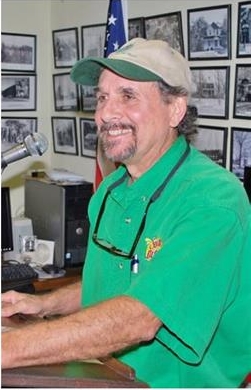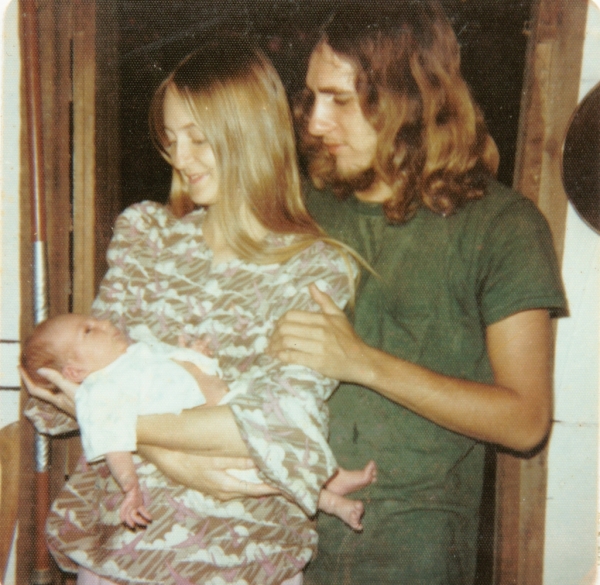An Original Member of The Farm Shares Its Story
Doyce Shaddox, Lawrence County Advocate, Lawrenceburg, TN| 10/15/2014
Note: In reviewing this article, I found a few inaccuracies or a places where my statements were misunderstood . I have made corrections here and there in parenthesis to help future readers receive accurate information.
I also edited out the opening paragraphs which talked about meeting details of the Lawrenceburg Historical Society.
Douglas

Douglas Stevenson
The presentation was given by Douglas Stevenson, a resident of “The Farm” in Summertown since I973. He came to The Farm when he was 19 years old along with his high school sweetheart. Deborah, from Louisville, Kentucky. Their two children were born on The Farm and so were their grandchildren.
The movement known as the “hippie movement“ began back in the late l950‘s and l960’s. Hundreds of thousands of young people, realizing they were not going to change the world through politics. began going out to California to try to change the world.
In their view, the world was going downhill because of the race riots, the war in Vietnam, the assassinations of political and movement leaders.
Stephen Gaskin, a former marine and a creative writing teacher, had an opportunity to start a class discussing all these issues and bringing people together. This was a class where they studied astrology, compared all the religions of the world and the eastern philosophies.
They looked at these things to determine what was real and what was superstition. They wanted to determine the essential basic truths to base their lives on and how to treat each other. To them it is a spiritual calling to care of each other and the planet.

Douglas and Deborah drove to The Farm in this VW van.
Realizing they needed to stop living in the buses designed for children, and with little money left, they went out and bought old Army tents for $25 each for temporary homes. Then they went out into the surrounding communities and found old houses and barns to be torn down and moved. They began cutting roads and erecting a water tank they had purchased for $1.00 for their water supply.
They felt it was logical to grow their own food. However, since they were a bunch of city kids, they knew nothing about farming. The Amish community sold them horses and showed them how to farm with them. Homer Sanders took them under his wing and taught them about felling trees, running heavy equipment, and producing lumber. As people began coming to the commune, first 300. then 500. 700, 1.000. then 1400, they realized farming with horses would not be feasible to feed everyone and tractors were needed. Rather than try to raise enough com, grain and soybeans to feed cattle, they used the land to raise soybeans, which is rich in protein, to make foods to feed the people, like tofu, ice cream and other foods.
 Douglas, Deborah and son Jody, born on the Farm.
Douglas, Deborah and son Jody, born on the Farm.
in the mid l9’70‘s they felt it was not just about building a perfect “hippie” commune, but a responsibility to give back to the world and be of service to mankind. When an earthquake in Guatemala occurred, they went down and built municipal buildings. schools. clinics, 1300 homes, and helped the Mayan Indians with clean water and sanitation. Douglas and wife Deborah. went and stayed two years, (he) working as a HAM radio operator and (she as) a laboratory technician, respectively.
With all this outreach, things back at The Farm were being neglected. Gasoline had gone from about $.50 a gallon to about $l.50 a gallon in one year. The construction industry tanked, and there was just not enough money coming in. They were spending about $10,000 a week and bringing in about $6,000 a week. They had started several small businesses that had not yet become profitable. They were living under a vow of poverty and all their income added up to about a dollar a day per person.
They have their own clinic with a pharmacy and doctors to take care of everyone but sometimes it (a person) requires medical attention that can be received only at a large hospital. Early on they became very indebted to a large hospital in Nashville. They carried no medical insurance and paid their bills out of pocket. Even though their land was jointly owned by everyone, when they (someone) went to the hospital, they were considered large land owners and were charged the full retail amount. They soon became over a half million dollars in debt.
Finally the unthinkable happened. This hospital put a lien on their land to pay for their services. They suddenly realized they were going to have to make changes or lose the entire farm. In September I983 they changed from being a communal economy where all the money went into one pot to being a collective economy where everybody was responsible for their own income, buying their own food, taking care of their own medical bills, their children‘s needs, and responsible for many other things. It was decided that every person must be responsible for helping with the community essentials, like schools, water purification, taxes, and roads.
Every adult was required to pay a total of $100 per month for these necessities. Another $35 per month was added to help pay off the debt to the hospital.
After three years the debt was paid and the land was once again free and clear.
Today the community is an ecovillage that has solar and other green conforming homes, many of which have beautiful interiors, all of which are owned by a trust and not the individuals. They have a solar heated school that teaches kindergarten (first grade) through high school. About half the students now
come from outside the community looking for a “looser” (more inclusive) environment that makes it easier (more flexible) for those who do not thrive under the rigid rules (shortcomings) of public education.
Their midwifery service is one of the main sources of income for the community, with people coming from all over the world to have their babies. The Book Publishing Company is their oldest business, employing about 25 people, publishing health (and) diet books, books about Native American life, and is now one of the primary publishers of vegetarian cookbooks.
The Farm’s largest business is Radiation Alert by S.E. International, Inc. This business was started after the nuclear disaster at Three Mile Island in Pennsylvania. At that time there were no small instruments to measure radiation, so they developed a Geiger counter that could be placed in a shirt pocket. These instruments are now sold in 60 countries around the world. They are used by the Army, all police forces, fire departments, the oil industry, and hospitals. The company now has a million dollar contract with FEMA (actually it was their first million dollar contract, and it happened a number of years ago). This business employs about 25 people who have been working double shifts to keep up with the demand (They went on double shifts after the nuclear disaster in Fukishima, Japan, but are now back on a single shift).
Another of their businesses is mail order catalogs that sell health food and books, etc. around the country.
Douglas’ personal business is Village Media that does video productions, web site design and hosting. For many years he was a partner with Jeff Hood
producing all the commercials for the cable company for Lawrenceburg, Pulaski, Columbia, and Fayetteville before the cable company took it over and produced them in-house.
Not much farming is done anymore but most everyone has a garden.
Swan Conservation Trust was established in 1992 and was dedicated to preserving and restoring native hardwood forests, wildlife habitat, biodiversity, and water quality. Big Swan Headwaters Preserve, established in 2004, has waterfalls and springs,and over five miles of clear running streams, 1475 acres of mature hardwood forest and grasslands, and has hiking trails under development. The logging industry has clearcut about 10,000 acres surrounding the area. Needless to say what would have happened had this area not been preserved.
The Farm is an intentional community of families and friends made up of predominantly Western European ethnicities (not restricted to this) (their parenthesis) living on three square miles near the community of Summertown, Tennessee. Each worship in their own way, either attending churches and synagogues outside The Farm, or worshiping and meditating within. Christmas and Easter and other ( spiritual and nonreligious holidays) are celebrated.
The people of The Farm have their own cemetery within the commune that now has 86 graves.
Their population at present is approximately I75, plus 20 to 40 guests at any one time. About 85 people are 60 and over (The founding generation) and about a third of the community is the next generation. mostly children of the founders.
The gates to The Farm are open to the public from 9AM to 7 PM.
“How long will The Farm exist’? How long will people live on this land as a community? Only time can answer that.”
From the book. Out To Change The World by Douglas Stevenson.



